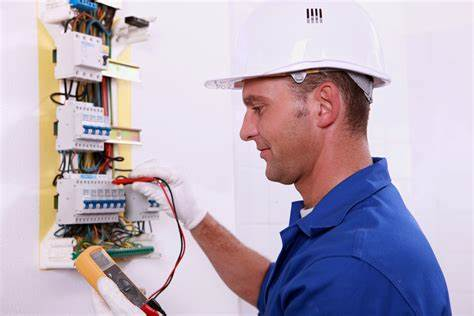London, a bustling metropolis with a thriving economy, presents a dynamic job market for qualified electricians. With a constant demand for electrical services in both residential and commercial sectors, the city offers numerous opportunities for skilled professionals.
Electricians play a crucial role in maintaining and developing London’s infrastructure, ensuring that homes, businesses, and public spaces are safely powered. As of December 2024, the demand for skilled electricians in London remains robust, offering numerous opportunities for both seasoned professionals and newcomers to the field.
Demand for Electricians in London
London’s continuous growth and development drive a consistent need for qualified electricians. The city’s expansion, coupled with advancements in technology and a focus on sustainable energy solutions, has led to a surge in electrical projects. This includes the installation of smart home systems, electric vehicle charging stations, and renewable energy integrations, all contributing to the increasing demand for skilled electricians.
Types of Electrician Jobs Available
Electricians in London can explore a variety of roles, each with distinct responsibilities:
Domestic Electricians: Specialize in residential properties, handling tasks such as wiring, lighting installations, and general electrical maintenance.
Commercial Electricians: Work in commercial settings like offices, retail stores, and restaurants, focusing on complex systems that require adherence to specific regulations.
Industrial Electricians: Operate in industrial environments, maintaining and repairing machinery, control systems, and large-scale electrical installations.
Maintenance Electricians: Responsible for the ongoing maintenance of electrical systems in various settings to ensure optimal performance and safety.
Qualifications and Training
To pursue a career as an electrician in London, individuals typically need to complete specific qualifications and training:
Educational Requirements: A Level 3 Diploma in Electrical Installation or an equivalent qualification is standard.
Apprenticeships: Combining practical experience with theoretical learning, apprenticeships are a common pathway into the profession.
Certification: Obtaining certifications from recognized bodies, such as the National Inspection Council for Electrical Installation Contracting (NICEIC), enhances credibility and employment prospects.
Salary Expectations
Salaries for electricians in London vary based on experience, specialization, and employer. As of December 2024, the average annual salary ranges from £35,000 to £45,000. Entry-level positions may start around £30,000, while experienced electricians, particularly those in specialized fields, can earn upwards of £50,000 per year.
Job Market and Opportunities
The job market for electricians in London is competitive yet promising. Numerous job portals list current openings:
Indeed: Features over 300 electrician jobs in London, with roles ranging from maintenance electricians to specialized positions in various sectors.
Glassdoor: Lists approximately 252 electrician jobs, providing insights into company ratings and salary expectations.
Reed.co.uk: Offers a selection of 125 electrician jobs in London, with detailed job descriptions and application guidelines.
Totaljobs: Presents around 266 electrician jobs, including opportunities in electrical maintenance and installation.
Career Progression
Electricians in London have various avenues for career advancement:
Specialization: Focusing on areas like renewable energy, smart systems, or high-voltage installations can lead to higher-paying roles.
Supervisory Positions: Gaining experience can open opportunities to become a site supervisor or project manager.
Self-Employment: Many electricians choose to become self-employed, offering services directly to clients and potentially increasing their earnings.
Challenges in the Profession
While the electrician profession offers numerous benefits, it also presents challenges:
Physical Demands: The job often requires manual labor, including lifting, bending, and working in confined spaces.
Safety Risks: Working with electricity carries inherent risks, necessitating strict adherence to safety protocols.
Regulatory Compliance: Electricians must stay updated with the latest regulations and standards to ensure compliance and safety.
Key Roles and Responsibilities:
Domestic Electricians: These professionals focus on electrical installations and repairs in residential properties, including:
New installations: Wiring new homes, installing lighting fixtures, and setting up electrical appliances.
Repairs and maintenance: Troubleshooting electrical faults, replacing faulty wiring, and carrying out general maintenance.
Electrical safety checks: Conducting electrical safety inspections and issuing Electrical Installation Condition Reports (EICRs).
Commercial Electricians: These electricians work on a wider range of projects, including:
Office buildings: Installing and maintaining electrical systems in offices, shops, and commercial spaces.
Industrial sites: Working on electrical installations in factories, warehouses, and other industrial facilities.
Construction sites: Installing electrical systems in new buildings and infrastructure projects.
Specialists: Some electricians specialize in specific areas, such as:
Data cabling: Installing and maintaining data networks.
Security systems: Installing and maintaining security systems, including CCTV and alarms.
Renewable energy: Installing and maintaining solar panels and other renewable energy systems.
Skills and Qualifications:
Essential Skills:
Technical expertise: A strong understanding of electrical principles, wiring regulations, and safety procedures.
Problem-solving skills: The ability to diagnose and troubleshoot electrical faults effectively.
Practical skills: Excellent manual dexterity and the ability to work with various tools and equipment.
Communication and interpersonal skills: The ability to communicate effectively with clients, colleagues, and other professionals.
Qualifications:
City & Guilds 2382-15: This is the industry-standard qualification for electricians in the UK.
18th Edition Wiring Regulations: Electricians must be up-to-date with the latest electrical safety regulations.
ECS Card: An Electrician’s Competency Scheme (ECS) card is required to work on construction sites.
Finding Electrician Jobs in London:
Job Boards: Utilize online job boards such as Indeed, LinkedIn, and Totaljobs to search for electrician vacancies in London.
Recruitment Agencies: Specialist recruitment agencies can help you find suitable electrician jobs in London.
Networking: Attend industry events, join professional organizations, and network with other professionals in the electrical industry.
Company Websites: Check the websites of major construction companies and electrical contractors for job openings.
Tips for Success:
Continuous Professional Development: Keep your skills updated by attending training courses and staying informed about the latest industry developments.
Build a Strong Network: Network with other professionals in the industry to learn about job opportunities and gain valuable industry insights.
Provide Excellent Customer Service: Building strong relationships with clients is crucial for success in the electrical industry.
Maintain a Professional Image: Present yourself professionally at all times, ensuring that your work is of the highest quality and that you adhere to all safety regulations.
FAQs
What are the general job prospects for electricians in London?
High Demand: London has a consistently high demand for qualified electricians due to its rapid growth, ongoing construction projects, and the need for regular maintenance and repairs in a densely populated urban environment.
Competitive Market: While demand is high, the market can also be competitive.
What are the typical job responsibilities of an electrician in London?
Installation and Maintenance:
Installing, maintaining, and repairing electrical wiring, fixtures, and appliances in residential, commercial, and industrial settings.
This includes tasks such as:
Installing and repairing lighting systems (including LED lighting)
Installing and repairing electrical wiring for appliances (cookers, washing machines, etc.)
Installing and maintaining security systems (alarms, CCTV)
Fault finding and troubleshooting electrical problems
Inspecting electrical systems for safety compliance
Domestic Work:
Rewiring homes, installing new circuits, and upgrading electrical systems to modern standards.
Commercial Work:
Working on larger projects such as office buildings, shops, and factories.
Industrial Work:
Working on industrial sites, including factories, warehouses, and power plants.
To read more,Click Here.





